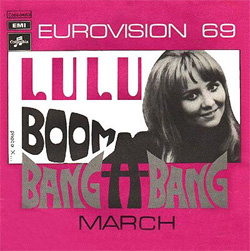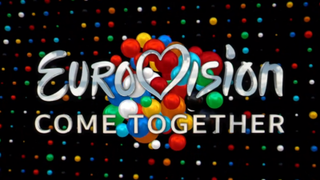
Lulu Kennedy-Cairns is a Scottish singer, actress, and television personality.
The United Kingdom held a televised national pre-selection broadcast on BBC1 to choose the song that would go to the Eurovision Song Contest 1969 with Scottish singer Lulu chosen to represent the UK.
The United Kingdom held a national preselection to choose the song that would go to the Eurovision Song Contest 1976.
The 1985 edition of A Song for Europe was held at the BBC Television Centre in Studio 1 on 9 April, hosted by a suited Terry Wogan. The theme music was Te Deum. The BBC Concert Orchestra under the direction of John Coleman as conductor accompanied all the songs, but despite performing live, the orchestra was off-screen, behind the set.
The United Kingdom competed in the Eurovision Song Contest 1998. In addition, the British Broadcasting Corporation (BBC) was also the host broadcaster and staged the event at the National Indoor Arena in Birmingham on 9 May 1998 after the nation won the competition in 1997 with the song "Love Shine a Light" performed by Katrina and the Waves. The BBC organised a public selection to select its entry for the contest, The Great British Song Contest 1998. Eight songs competed over two rounds, with four songs selected through a radio-broadcast semi-final advancing to the televised final round, held on 15 March 1998, where viewers selected the winning entry through televoting. Imaani received the most votes and was selected to represent the UK in the contest with the song "Where Are You?". Imaani performed 16th at the international contest, and at the close of the voting process the UK finished in second place with 166 points, the nation's 15th second-place finish since its debut.
The United Kingdom competed in the Eurovision Song Contest 1999, held on 29 May 1999 at the International Convention Center in Jerusalem, Israel. The British Broadcasting Corporation (BBC) organised a public selection process to determine its entry for the contest, The Great British Song Contest 1999. Eight songs competed over two rounds, with four songs selected through a radio-broadcast semi-final to advance to the televised final round, held on 7 March 1999, where viewers selected the winning entry through televoting. Girl group Precious received the most votes and were selected to represent the nation in the contest with the song "Say It Again".
The United Kingdom participated in the Eurovision Song Contest 2002 with the song "Come Back" written by Martyn Baylay. The song was performed by Jessica Garlick. The British entry for the 2002 contest in Tallinn, Estonia, was selected via the national final A Song for Europe 2002, organised by the British broadcaster BBC. Eight acts competed in the national final which consisted of a semi-final and a final, during which the winner was selected entirely through a public televote.
The United Kingdom participated in the Eurovision Song Contest 2004 with the song "Hold Onto Our Love" written by Gary Miller and Tim Woodcock. The song was performed by James Fox. The British entry for the 2004 contest in Istanbul, Turkey was selected via the national final Eurovision: Making Your Mind Up 2004, organised by the British broadcaster BBC. Six acts competed in the national final and the winner was selected entirely through a public vote.

Bang-Bang-a-Boom! is a Big Finish Productions audio drama based on the long-running British science fiction television series Doctor Who. The title is a parody of Lulu's 1969 Eurovision Song Contest winning entry Boom Bang-a-Bang.

Congratulations: 50 Years of the Eurovision Song Contest was a television programme organised by the European Broadcasting Union (EBU) to commemorate the Eurovision Song Contest's fiftieth anniversary and to determine the contest's most popular entrant of its fifty years. Hosted by Katrina Leskanich and Renārs Kaupers, the event took place at Forum, in Copenhagen on 22 October 2005. The host was Danish broadcaster DR. Fourteen songs from the Contest's first half-century, chosen through an internet poll and by a jury, contested the event.
The United Kingdom participated in the Eurovision Song Contest 2006 with the song "Teenage Life" written by Daz Sampson and John Matthews. The song was performed by Daz Sampson. The British entry for the 2006 contest in Athens, Greece was selected via the national final Eurovision: Making Your Mind Up 2006, organised by the British broadcaster BBC. Six acts competed in the national final and the winner was selected entirely through a public vote.

"Boom Bang-a-Bang" is a song recorded by Scottish singer Lulu. The song was written by Alan Moorhouse and Peter Warne. It was the British winning entry at the Eurovision Song Contest 1969, held in Madrid. It was the joint winner with three other entries: Salomé singing "Vivo cantando" for Spain, Lenny Kuhr singing "De troubadour" for the Netherlands, and Frida Boccara singing "Un jour, un enfant" for France.

"Diggi-Loo Diggi-Ley" was the winning song in the Eurovision Song Contest 1984 performed in Swedish by the trio of brothers Herrey's, representing Sweden. Lyrics were written by Britt Lindeborg, and the tune by Torgny Söderberg. It was produced by Anders Engberg and Torgny Söderberg.

"De troubadour", sung in Dutch by Lenny Kuhr representing the Netherlands, was – together with "Boom Bang-a-Bang", "Un jour, un enfant", and "Vivo cantando" from, respectively, the United Kingdom, France, and Spain – one of the four winners of the Eurovision Song Contest 1969.

The United Kingdom has participated in the Eurovision Song Contest 64 times. It first took part in the second contest in 1957 and has entered every year since 1959. Along with Sweden and the Netherlands, the UK is one of only three countries with Eurovision victories in four different decades. It is one of the "Big Five" countries, along with France, Germany, Italy and Spain, that are automatically prequalified for the final each year as they are the biggest financial contributors to the European Broadcasting Union (EBU). The British national broadcaster, the BBC, broadcasts the event and has, on multiple occasions, organised different national selection processes to choose the British entry. The United Kingdom has won the Eurovision Song Contest five times, and has finished as runner-up on a record sixteen occasions. The UK has hosted the contest a record eight times, four times in London and once each in Edinburgh (1972), Brighton (1974), Harrogate (1982) and Birmingham (1998), and will host the contest for a ninth time in 2023 in Liverpool.
The United Kingdom participated in the Eurovision Song Contest 2009 with the song "It's My Time" written by Andrew Lloyd Webber and Diane Warren. The song was performed by Jade Ewen. The British entry for the 2009 contest in Moscow, Russia was selected via the national final Eurovision: Your Country Needs You, organised by the British broadcaster BBC. Six acts competed in the national final which consisted of two heats, a semi-final and a final, during which the winner was selected entirely through a public televote.
Germany was represented by Katja Ebstein, with the song "Diese Welt", at the 1971 Eurovision Song Contest, which took place on 3 April in Dublin. Ebstein was chosen internally to be the German representative, and the song was selected at the German national final, Ein Lied für Dublin, held on 27 February. This was the second of Ebstein's three appearances for Germany at Eurovision and she became the second performer, after Margot Hielscher, to represent the country in successive years.

Songs of Europe is a concert television programme commemorating the Eurovision Song Contest's twenty-fifth anniversary. The event was held in Mysen, Norway in 1981, featuring all but eight of the winners of the Eurovision Song Contest from its first edition in 1956 to 1981, and broadcast to more than 100 million viewers all over Europe.
The United Kingdom originally planned to participate in the Eurovision Song Contest 2020 with the song "My Last Breath" written by James Newman, Ed Drewett, Adam Argyle and Iain James. The song was performed by James Newman, who was internally selected by the British broadcaster BBC to represent the United Kingdom at the 2020 contest in Rotterdam, Netherlands. Newman and "My Last Breath" was announced as the British entry on 27 February 2020.

Eurovision: Come Together was a one-off television programme, organised and broadcast by the BBC, to determine the most popular song in the 64-year history of the Eurovision Song Contest, as voted for by the British public.








